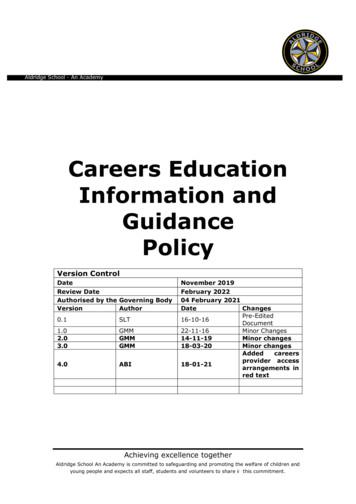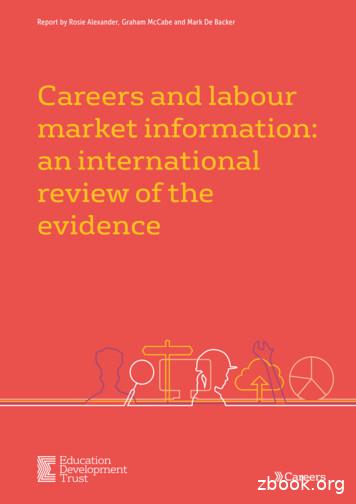Exploring Opportunities: CAREERS
CAREERSA Guide for Students, Parents and Teachers.Exploring Opportunities:in theMinerals IndustryEdited by: Anthony K.M. Staley and John L. Uhrie
Today’s mineralsindustry offers a widerange of rewardingcareers that feature topsalaries, travel and the chanceto work with advancedtechnology. This handbookprovides an overview of theseopportunities and could putyou on the path to an excitingcareer in the minerals industry.
Exploring Opportunities:Careers in the Minerals IndustryPublication Edited by: Anthony K.M. Staley and John L. UhriePhoto: Copyright 2007 Freeport-McMoRan Copper & GoldTable of contentsIs a Career in the Minerals Industry for You? . . . . . . . . Page 1This career guidance booklet ispresented as a public service tostudents, parents and teachers by theSociety for Mining, Metallurgy andExploration (SME), Inc. SME is devotedto serving members who are involved inmineral resources exploration, mining,processing and reclamation.Society for Mining, Metallurgyand Exploration (SME), Inc.8307 Shaffer ParkwayLittleton, Colorado ions about Careers in the Minerals Industry . . . . Page 2Top 10 Benefits of a Career in the Minerals Industry . . Page 3Exploring Opportunities:In Geology . . . . . . . . . . . . . . . . . . . . . . . . . . . . . . Page 4In Geological Engineering . . . . . . . . . . . . . . . . . . . Page 6In Mining . . . . . . . . . . . . . . . . . . . . . . . . . . . . . . . Page 8In Mineral Processing . . . . . . . . . . . . . . . . . . . . . . Page 10In Environment . . . . . . . . . . . . . . . . . . . . . . . . . . . Page 12In Health and Safety . . . . . . . . . . . . . . . . . . . . . . . Page 14Academics: Making the Right Choices . . . . . . . . . . . . . Page 16Photo Credits:Copyright 2007Freeport-McMoRan Copper & GoldPublication supported and made possible by:Copyright 2008Society for Mining, Metallurgy andExploration, Inc.All Rights ReservedPrinted in the United States of AmericaSeeley W. Mudd Memorial Fund of AIME
Is a CAREER in the Minerals Industry for You?You may not know it, but minerals affectyour life in almost every way. You mayknow that the minerals industry provides thematerials that pave your roads and heat yourhome, but what about your stereo, yourchewing gum and the medicine your doctorprescribes? Minerals are used in all of them.Even in your own home, minerals areneeded for everything from the carpet to thecountertops. In fact, those in the mineralsindustry have a saying: if it can’t be grown, itmust be mined.Today’s minerals industry offers a wide rangeof exciting and rewarding careers for thosewho want to be a part of such a vital field.Careers in the minerals industry offer topsalaries and benefits, variety, travel, thechance to work with advanced technology,continuous career training, opportunities foradvancement, responsibility, challenge andleadership.The minerals industry is constantly seekingcreative and enthusiastic people who cantackle the many different facets of theresource-extraction process. This handbookprovides a quick overview of some of theexciting careers in the minerals industry.For more information on this subject, pleasecontact the Society for Mining, Metallurgyand Exploration (SME), Inc. For moreinformation on how your academic goalscan lead you to a career in the mineralsindustry, be sure to talk with your schoolguidance counselor.1
?Questions about Careers in the Minerals IndustryWhat is the minerals industry all about?The minerals industry is about quality of life, both fortoday and tomorrow. The minerals industry produces theraw materials for many of the items you use each day: thehouse you live in, the foods you eat, the clothes you wear,and the car you drive. Everything from lipstick to breakfastcereal—even your toothpaste—could not be made withoutthe minerals industry.?How open is the minerals industry towomen and minorities?The industry is open to women and minorities. In fact,many senior executives in the mining industry arewomen. In increasing numbers, women and minoritiesare pursuing careers in the minerals industry and fillingpositions without question of gender, race or nationality.A perfect example of this is Barb Filas.Name: BARBARA FILASEducation: B.S. 1978 in MiningEngineering, University of ArizonaPosition: President,Knight Piesold LLC,Denver, ColoradoWhat is my career outlook in theminerals industry?The career outlook for the minerals industry remainspositive and the demand is predicted to steadily anddramatically increase in the years to come. Althoughsomewhat cyclic, the overall use of minerals and metalsare increasing every year due to the improvement ofliving conditions in the developing world, increasedhuman longevity and new uses. As a result, new sourcesof the minerals must be found and produced worldwide.“As a third-generation miner, I’ve grown up lovingthe mines: from old abandoned dog-holes to huge,contemporary operations. I have always lovedtraveling, too, seeing new places and meeting newpeople. I never dreamed that there was a ‘job’ thatwould combine the two, but the consulting work Ido for the mining industry requires me to travel allover the world visiting all kinds of mines; suppliesme with tour guides like biologists, geologists,archaeologists and socioeconomics who make sureI understand the ecological, human interest andhistorical aspects of those sites; and as unbelievableas it may seem, they actually pay me.”2
Top 10 Benefitsof a Career in the Minerals Industry1. Job Satisfaction.12. Benefit to Society.2A career in the minerals industry will allow you to workon projects that clearly benefit society. For example, youcan be involved in minerals extraction projects thatminimize impact on the environment, find new sources ofenergy and increase the standard of living for peoplearound the world.33. Challenging Work.The minerals field has no shortage of challengingproblems. In school, most problems have a single correctanswer. In the field, when finding solutions involvingcomplex geologic materials, you must often work withincomplete and uncertain data. You must devise acreative solution and persuade others that your solution isthe best one.44. Opportunities for Career Advancement.As the world continues to develop and the globaleconomy expands the demand for minerals and mineralprocessing continues to increase. The world will alwaysneed minerals and that means opportunities now and inthe future.55. Financial Benefits.The minerals industry is one of the highest paying of allindustries. Because of the challenges and rewardsinvolved in the minerals industry, companies offerexcellent financial benefits in order to attract the verybest people.366. Variety of Work Environments.Studies have shown that job dissatisfaction is one of thetop reasons for unhappiness among people in the UnitedStates. People in the minerals industry enjoy a high levelof job satisfaction and some of the reasons why are listedbelow.Do you like to work outdoors in the fresh air or do youprefer the indoors? Would you like to work in a busy cityskyscraper or would you rather be at a remote site? Isyour goal to work in the United States or overseas? Howabout working underground or even on the ocean floor?Only the minerals industry offers such a wide variety ofworking environments.7. Prestige.7Your career in the minerals industry will contributesignificantly to our Nation’s international competitivenessand will ensure a strong national security, help maintainand improve our standard of living, and protect theenvironment. People understand that it takes hard workand strong technical skills to work in the mineralsindustry and you will be recognized for that.88. Variety of Work Experiences.The minerals industry is extremely diverse. Its activitiesinclude exploration for mineral deposits, developing newmine sites, underground or surface mines, processingminerals to extract the commodity and the transportationand marketing of mineral products.99. Safe and Professional Work Environment.The minerals industry has unique hazards and safetychallenges, and working in mining you will find thatmanagement and workers agree that everyone has apersonal commitment for the safety and well-being offellow workers.1010. Creative Thinking.The infinite variety of occurrences and properties ofnatural materials that you will work with in the mineralsindustry requires creative thinking. You will be requiredto develop solutions to open-ended and unique problemsthat require the ability to think beyond the obvious andinclude requirements across many disciplines.
exploring opportunities:in GeologyWhat is geology?Geology is the scientific study of the nature, formation,origin and development of the planet Earth, including itsraw materials, natural processes and resulting products.Why is geology important to the mining industry?The knowledge of the Earth, its processes and itsmaterials are used to aid in the discovery of metals,minerals and fuels, to identify geological conditions,hazards and stability of mine sites and to remediate andreclaim mine and mill sites.What geological specialists are used by themining industry?There are many specialists in the field of geology. Theseinclude mineralogy, petrology, paleontology, geophysics,geochemistry, hydrology, engineering geology, economicgeology and environmental geology.What are the jobs for geoscientists?Geoscientists and geological engineers work for miningand exploration companies, consulting, and geotechnicalfirms that provide technical expertise to the miningindustry, government agencies such as the United StatesGeological Survey and state geological surveys anduniversities. Companies that employ geosciencesprofessionals range in size from Fortune 500 corporationsthat employ hundreds to small consulting firms that mayemploy only a few individuals.Photo: Copyright 2007 Freeport-McMoRan Copper & GoldFOCUS ON:Specialties in GeologyGeologist. Geologists study the materials and processes ofthe Earth to explain how, when and why events occurred inthe formation of the Earth’s rock record. Economic geologistsapply geology to explore for, develop the metal, mineral, andcoal resources that are used as the foundation of our standardof living and modern society. Structural geologists analyzethe Earth’s forces by studying deformation, fracturing andfolding of the Earth’s crust.Geochemist. Geochemists use physical, organic andinorganic chemistry to investigate the type and distribution ofmajor and trace elements and organic compounds in rocks,soils and waters.Mineralogist. Mineralogists study mineral formation, crystalstructure, chemistry and properties to understand ore genesis,to develop process strategies for mineral liberation andbeneficiation, and to develop and modify mineral-basedproducts for industrial and consumer use.Geophysicist. Geophysicists apply the principles of physicsto studies of the Earth’s interior and investigate Earth’smagnetic, electrical and gravitational properties.Geophysical Engineer. Geophysical engineers applygeophysical techniques to understand and plan for geologicconditions that affect mines.4
Profile in GeologyName: RAY YOSTEducation: B.S. 1992 in Geology, OregonState University and M.S. 1996 in GeologicalEngineering, University of ArizonaPosition: Principal Geological Engineer,Rio Tinto Minerals – Boron Operations,Boron, California“I am a geological engineer at California’s largest open pit mine and my roleencompasses several of the specialties in the field of geology – stabilityanalysis, hydrology, slope and pore pressure monitoring, rock mechanics,geophysics, slope design, failure mitigation and mine reclamation. Centralto many of these aspects is a sound understanding of statistics andprobability given the variability in earth materials and in earth processes.Beyond the technical role, I also spend a considerable amount of timementoring and developing existing staff, recruiting new personnel,budgeting, developing programs, training, and, of course, working onnumerous aspects of safety. Geotechnical engineering plays a key role inmaintaining a safe working environment in the mine through thedevelopment of reliable slopes, in the monitoring of final and workingslopes and in the mitigation of slope failures. On the personal side,I attend regular safety meetings, perform safety observations, and aminvolved in risk assessment for processes throughout the site.What I most enjoy about the career is the ability to blend technicalchallenges with personnel and program management in what can be a fluidand rapidly changing environment. My schedule is a mix of analyses,people, numbers, long term forecasts, immediate data, assessments,interviews, reading, travel, and writing and few days are ever the same.”Photo: Copyright 2007 Freeport-McMoRan Copper & Gold5
exploring opportunities:in Geological EngineeringWhat is a geological engineer?Geological engineering combines the fields of geology andengineering in a way that is exciting, logical, and unique.Geological engineers evaluate sites. They examine ways tosearch for and harvest mineral and energy resources. Theyanalyze geologic hazards. Geological engineers discoverways to protect earth’s environment while producingneeded resources. Their work is very much out-of-doorsoriented but uses the most recent technology.Why is geological engineering important to theminerals industry?Geological engineering brings a unique combination of thescience of geology and engineering practice to theminerals industry. This unique set of skills enablesgeological engineers to work effectively in the mineralsindustry using their understanding of the earth’s crust.What geological engineering specialists are used inthe minerals industry?Expertise provided to the mining industry includesexploration for and development of mineral and energyresources and construction materials resources; site andgeotechnical evaluations, (slope stability, rock mechanics;previous site/land use impacts); land reclamation; andhydrogeology (ground water and surface water).Where are the jobs for geological engineers?Geological engineers serve the minerals industry tointegrate knowledge of engineering, the science of geology,and stewardship of the earth’s resources and environment.They work for minerals and aggregate companies,consulting companies that support mining companies, andequipment and services providers to mining companies.FOCUS ON:Specialties inGeological EngineeringExploration. Geological engineers are involved in exploringand characterizing the quantity, quality, properties, and valueof mineral resources. Results from these efforts form the basisfor determining the feasibility for mining andreclamation/post mining site use.Site Characterization, Geological engineers are involved incharacterizing geologic conditions (soil, rock, groundwater,etc.) and hazards at the mine sites for the safe design,construction, operation, and closure of these facilities.Hydrogeology, Geological engineers evaluate ground andsurface water conditions with respect to quality, quantity,flow and volumes, and protection or remediation of theseresources.Geotechnical. Geological engineers assess the physicalproperties of soils and rocks for safe design of foundations,tunnels, excavations, pit slopes, and other facilities for allkinds of mining, construction, and development practices.Environmental Studies. Geological engineers will be part ofa team to design and construct mine waste disposal andenvironmental protection facilities, e.g., tailings dams, andthe development and conduct of reclamation plans atmine sites.Management, Geological engineers will, after gainingexperience in exploration, design, operation and leadership,move up the ladder to management positions.Geological engineers work for federal and state agencies.They also start and manage their own consulting or servicecompanies.6
Profile in Geological Engineering:Name: RYAN STACKEducation: B.S. Geological Engineering 2002, University of Missouri-RollaP.E. January 2008Position: Environmental Engineer Missouri Department of Natural ResourcesJefferson City, Missouri"In just over five years in the aggregate industryI have had great opportunity to travel and utilize mybackground in geotechnical and geologicalengineering. I worked as the Quality Control Managerat the FEC Quarry in Miami, Florida, the largestproduction aggregate quarry in America producingover 13 million tons per year. As a Division TechnicalManager for Rinker Materials in Knoxville, Tennessee,I used my geotechnical background ensuring thequality of our products and their end uses in concreteand asphalt for 18 quarry locations. The technicalside of aggregates utilizes statistics and the engineeringproperties of soil and rock extensively to assist inmanagement decisions of production and sales.Surrounded and supported by professionals, I reachedmy goal of acquiring Professional Engineeringlicensure in the State of Tennessee. I now reside in myhometown in South Central Missouri and remain working with the industry by ensuring our operationswork within the State of Missouri permit requirements. Geological Engineering poured the foundationand paved the road for my career. Rock On!"7
exploring opportunities:in MiningWhat is mining?Mining is varied in its application, but consists ofextracting the desired mineral resources that are foundnaturally deposited within the earth. This requires anunderstanding of the market for the particular mineral orminerals, the economics associated with the actualoperation and maintenance of the mining facility andcoordination with other mineral scientists to convert themineral resource into a salable product. It also requiresthe implementation of sound engineering practices,good equipment operation and maintenance proceduresand compliance with safety and environmentalregulations.Why is mining engineering important to theminerals industry?Mining is the first step toward extracting the mineralresource. Mining is the initial selection process wherethe material that is desired is separated from the nondesired material. Engineering is required to identify theresource and to finally optimize the extraction of themineral resource.Where are the jobs for mining engineers?Mining engineers work all over the world. They arelocated at corporate offices or consulting services officesthat are typically located in major cities throughout theworld. They are also located at operating properties thatmay be near urban areas such as sand and graveloperations. But typically, mining engineers are locatedin more remote locations.FOCUS ON:Specialties in Mining EngineeringMine Valuation. Mine valuation is the process of determiningthe worth of a specific mineral deposit. This is necessary todetermine the viability of extracting the mineral resource andmaking a return on the investment.Mine Design. After a mineral resource is located and defined,the approach to mining the deposit must be engineered. Themethod of mining must be established, typically defined assurface or underground mining. The selection of whichmethod to use must consider many factors, which will bespecific to the site and location of the deposit.Materials Handling. Mining is the process of selecting theresource material from other materials. Generally, dependingon the nature of the mine, the volume of the materials thatmust be handled is quite large, whether the resource itself, thesurrounding materials or the combination of both.Rock Excavation. The most common method of extractingthe resource rock is excavation. The method of excavating therock will vary dramatically depending on the physicalproperties of the rock. Rock excavation may be accomplishedby simple scraping or gouging practices, in the case of softmaterials such as coal. Or it may require intense drillingfollowed by loading explosives in the drill holes and blasting.Ventilation. In undergr
Profile in Geology Name: RAY YOST Education: B.S. 1992 in Geology, Oregon State University and M.S. 1996 in Geological Engineering, University of Arizona Position: Principal Geological Engineer, Rio Tinto Minerals – Boron Operations, Boron, California “I am a geological e
Careers & Enterprise Company: Guide for new Careers Leaders in schools. Essential information, helpful resources and practical tools to help newly appointed Careers Leaders get started in the role. National Careers Service. The National Careers Service provides information, advice and guidance to help people make decisions on learning, training and work opportunities. The service .
careers that relate to the environmental goal defined on their worksheet. Students can search for related careers by keyword, subject area, or cluster. (If they need help identifying careers that fit their assigned goal, they can find the example careers in the program and look in the Related Careers section for inspiration.)
The concept of careers and career-related learning in the primary school phase typically provokes a cautious reaction. Terms such as 'careers learning', 'careers education' or 'careers lessons' are often conflated with careers guidance which is often understood to be focused on careers choice. Many parents and teachers have concerns
Careers in Context: A can-do guide careersandenterprise.co.uk 4. Practical resource and support: 1. Use the Teach First four-step process for creating a strategic careers plan. To learn more about this, complete the free ‘Introduction to Careers Leadership’ online training 2. Read the Cheadle Hulme Case Study to see how a school has aligned their strategic career plans to wider school .
Our e-pack of careers guidance resources will help you deliver impartial careers information, advice and guidance in line with your statutory guidance duties and help you work towards several of the Gatsby Benchmarks. This pack is designed to add value to your existing careers provision and give you time-saving tools and resources to help you effectively and efficiently plan careers lessons .
The Parents’ Guide to Careers for National Careers Week 2021 The Parents’ Guide to Careers for National Careers Week 2021 Page 22 www.theparentsguideto.co.uk Where to find the right apprenticeship There’s a wide range of ways to seek out apprenticeships and we recommend using a selection of options rather than relying on one. Government website Most apprenticeships are posted on the .
information or ask the careers advisor a careers related question or enquiry. The careers advisor will arrange to attend visits to employers, Further and higher Education institutions, training providers and related Careers Conferences and workshops to support LMI knowledge and keep up-to
careers advice in the community or in schools, are key to success. Vital to the work of these careers advisers is access and familiarity with a robust and sophisticated body of intelligence about the labour market. To support individual users of the careers services, either in the community or in schools, careers practitioners must























